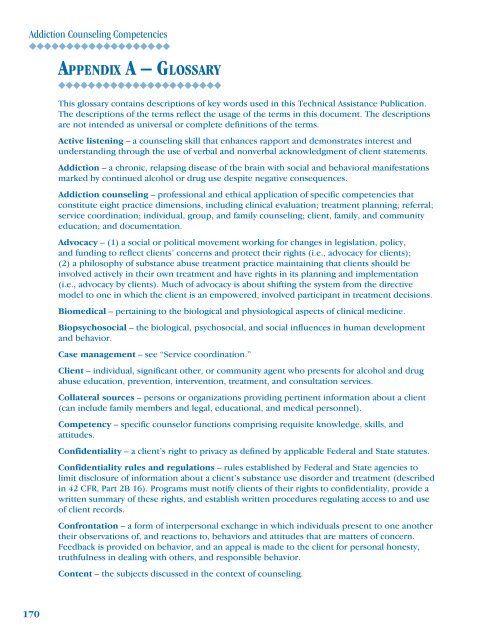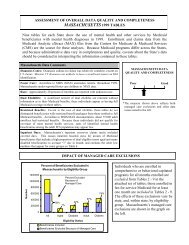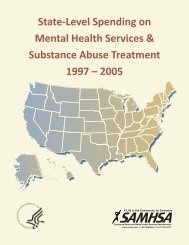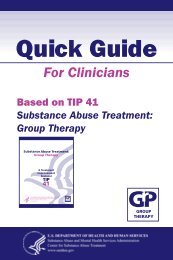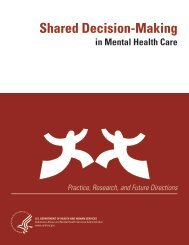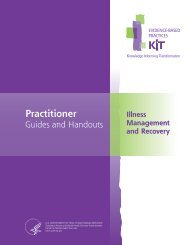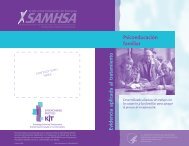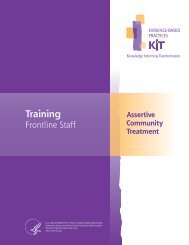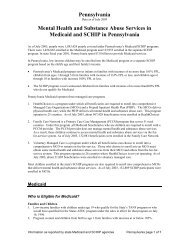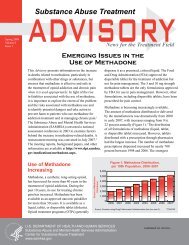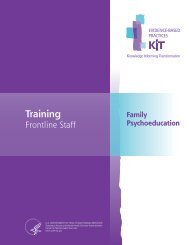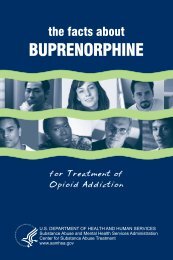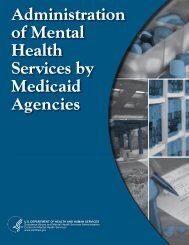TAP 21 - SAMHSA Store - Substance Abuse and Mental Health ...
TAP 21 - SAMHSA Store - Substance Abuse and Mental Health ...
TAP 21 - SAMHSA Store - Substance Abuse and Mental Health ...
Create successful ePaper yourself
Turn your PDF publications into a flip-book with our unique Google optimized e-Paper software.
Addiction Counseling Competencies<br />
Appendix A – Glossary<br />
This glossary contains descriptions of key words used in this Technical Assistance Publication.<br />
The descriptions of the terms reflect the usage of the terms in this document. The descriptions<br />
are not intended as universal or complete definitions of the terms.<br />
Active listening – a counseling skill that enhances rapport <strong>and</strong> demonstrates interest <strong>and</strong><br />
underst<strong>and</strong>ing through the use of verbal <strong>and</strong> nonverbal acknowledgment of client statements.<br />
Addiction – a chronic, relapsing disease of the brain with social <strong>and</strong> behavioral manifestations<br />
marked by continued alcohol or drug use despite negative consequences.<br />
Addiction counseling – professional <strong>and</strong> ethical application of specific competencies that<br />
constitute eight practice dimensions, including clinical evaluation; treatment planning; referral;<br />
service coordination; individual, group, <strong>and</strong> family counseling; client, family, <strong>and</strong> community<br />
education; <strong>and</strong> documentation.<br />
Advocacy – (1) a social or political movement working for changes in legislation, policy,<br />
<strong>and</strong> funding to reflect clients’ concerns <strong>and</strong> protect their rights (i.e., advocacy for clients);<br />
(2) a philosophy of substance abuse treatment practice maintaining that clients should be<br />
involved actively in their own treatment <strong>and</strong> have rights in its planning <strong>and</strong> implementation<br />
(i.e., advocacy by clients). Much of advocacy is about shifting the system from the directive<br />
model to one in which the client is an empowered, involved participant in treatment decisions.<br />
Biomedical – pertaining to the biological <strong>and</strong> physiological aspects of clinical medicine.<br />
Biopsychosocial – the biological, psychosocial, <strong>and</strong> social influences in human development<br />
<strong>and</strong> behavior.<br />
Case management – see “Service coordination.”<br />
Client – individual, significant other, or community agent who presents for alcohol <strong>and</strong> drug<br />
abuse education, prevention, intervention, treatment, <strong>and</strong> consultation services.<br />
Collateral sources – persons or organizations providing pertinent information about a client<br />
(can include family members <strong>and</strong> legal, educational, <strong>and</strong> medical personnel).<br />
Competency – specific counselor functions comprising requisite knowledge, skills, <strong>and</strong><br />
attitudes.<br />
Confidentiality – a client’s right to privacy as defined by applicable Federal <strong>and</strong> State statutes.<br />
Confidentiality rules <strong>and</strong> regulations – rules established by Federal <strong>and</strong> State agencies to<br />
limit disclosure of information about a client’s substance use disorder <strong>and</strong> treatment (described<br />
in 42 CFR, Part 2B 16). Programs must notify clients of their rights to confidentiality, provide a<br />
written summary of these rights, <strong>and</strong> establish written procedures regulating access to <strong>and</strong> use<br />
of client records.<br />
Confrontation – a form of interpersonal exchange in which individuals present to one another<br />
their observations of, <strong>and</strong> reactions to, behaviors <strong>and</strong> attitudes that are matters of concern.<br />
Feedback is provided on behavior, <strong>and</strong> an appeal is made to the client for personal honesty,<br />
truthfulness in dealing with others, <strong>and</strong> responsible behavior.<br />
Content – the subjects discussed in the context of counseling.<br />
170


